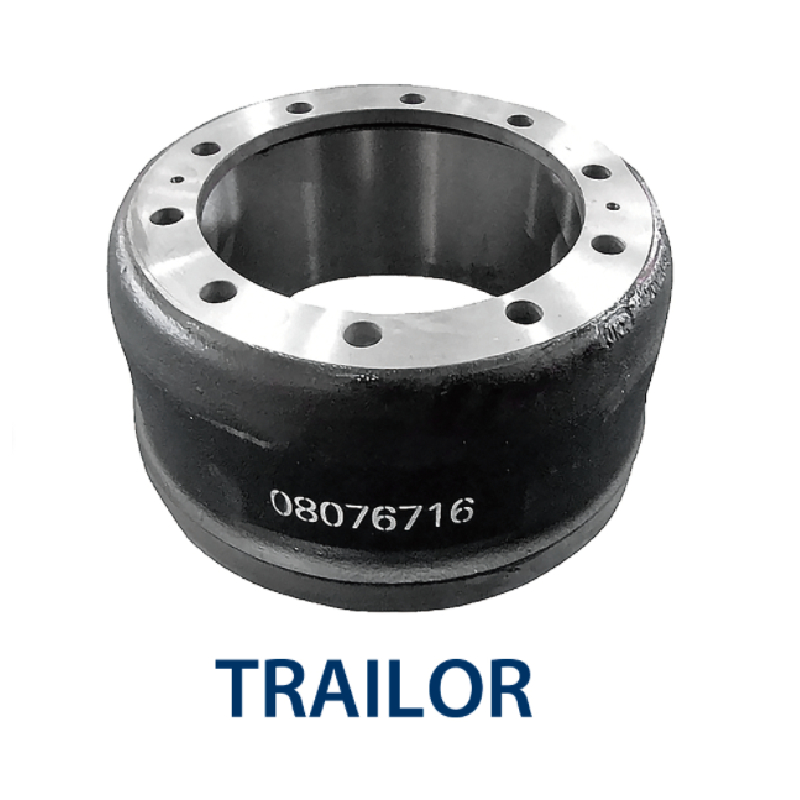พ.ย. . 17, 2024 01:53 Back to list
replace brake drums with discs
Replacing Brake Drums with Discs The Benefits and Considerations
When it comes to vehicle safety, the braking system plays a pivotal role in ensuring that automobiles can stop effectively and promptly. Among the various components of a braking system, brake drums and brake discs are two prevalent types of mechanisms that perform this critical task. However, in recent years, the trend of replacing traditional brake drums with brake discs has gained significant traction. This article delves into the benefits and considerations of making this switch.
Understanding Brake Drums and Discs
Brake drums are cylindrical components that work on the drum brake principle. When the driver presses the brake pedal, hydraulic pressure forces brake shoes against the inner surface of the drum, creating friction that slows down the vehicle. Conversely, disc brakes utilize a circular metal disc (the brake rotor) and a set of brake pads. When the brake pedal is engaged, the pads clamp down on the disc, generating the necessary friction to stop the vehicle.
Advantages of Brake Discs over Drums
1. Improved Performance One of the most notable advantages of disc brakes is their superior performance in terms of heat dissipation. Disc brakes have a larger surface area exposed to air, allowing them to cool more quickly. This feature significantly reduces the risk of brake fade—a decrease in braking efficiency caused by overheating—especially during prolonged or aggressive braking.
2. Enhanced Stopping Power Disc brakes tend to offer better stopping power compared to drum brakes. With their more responsive design and improved grip, disc brakes provide quicker stopping distances. This characteristic is particularly essential in emergency situations where every second counts.
3. Reduced Maintenance Although the initial cost of installing disc brakes may be higher than that of drums, they often lead to lower long-term maintenance costs. Drum brakes are more prone to wear and tear due to their enclosed design, which can trap debris and moisture. Disc brakes, being exposed, allow for easier inspection and cleaning, leading to prolonged lifespans.
4. Consistent Performance in Various Conditions Disc brakes tend to perform more consistently in wet conditions. Drum brakes can suffer from water ingress, leading to reduced friction and increased stopping distances. Disc brakes, on the other hand, shed water more effectively, ensuring reliable performance regardless of weather conditions.
replace brake drums with discs

Considerations When Making the Switch
While the benefits of replacing brake drums with discs are apparent, several important considerations should be taken into account
1. Cost Implications Converting from drum brakes to disc brakes requires an investment. Not only are the parts more expensive, but the installation process may also involve modifications to the vehicle's suspension and brake lines. Budgeting for this transition is crucial for prospective owners.
2. Vehicle Compatibility Not all vehicles are designed to accommodate disc brakes. Depending on the make and model, modifications might be needed, which could complicate the installation. It's essential to consult a professional to assess compatibility before embarking on this upgrade.
3. Driving Requirements The decision to switch largely depends on the vehicle's intended use. For performance-oriented vehicles or those used in heavy-duty applications, disc brakes provide clear advantages. However, for lightweight vehicles or those used for commuting in urban settings, traditional drum brakes may still suffice.
4. Aesthetic Considerations In addition to functionality, many enthusiasts appreciate the aesthetic appeal of disc brakes. They can enhance the look of the wheels, presenting a sportier appearance that aligns with the performance image of a vehicle.
Conclusion
Replacing brake drums with disc brakes is a decision that offers numerous advantages, including improved performance, reduced maintenance, and better safety. While initial costs and vehicle compatibility are essential considerations, the overall benefits often make this upgrade worthwhile. As automotive technology continues to advance, discerning drivers are encouraged to evaluate their braking systems carefully and make informed choices that enhance both safety and performance on the road.
-
DAF Water Treatment Solutions: Efficient Solids & Oil Removal
NewsAug.10,2025
-
Genuine Nissan Brake Drums | OEM Fit & Performance
NewsAug.09,2025
-
Seamless International Solutions for Global Business & Travel
NewsAug.08,2025
-
Premium Volvo Brake Drums: Truck, Semi & VNL Performance Parts
NewsAug.07,2025
-
BPW Axles & Suspensions | Quality Running Gear for Trailers
NewsAug.06,2025
-
Premium Iveco Brake Drum - Durable & Reliable Performance
NewsAug.05,2025
